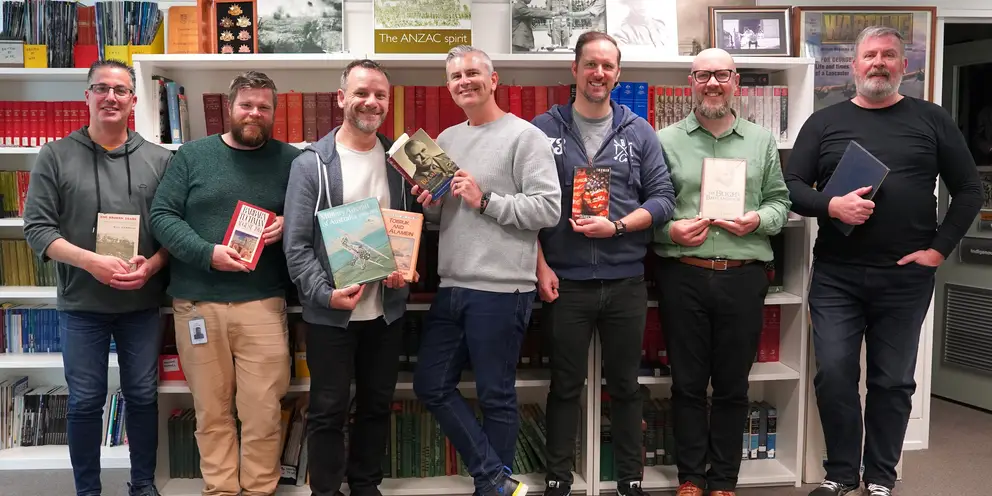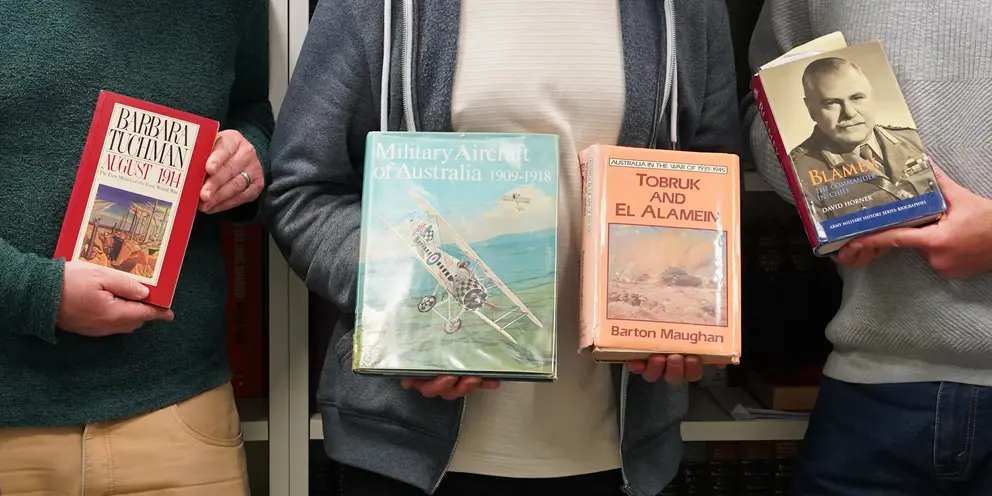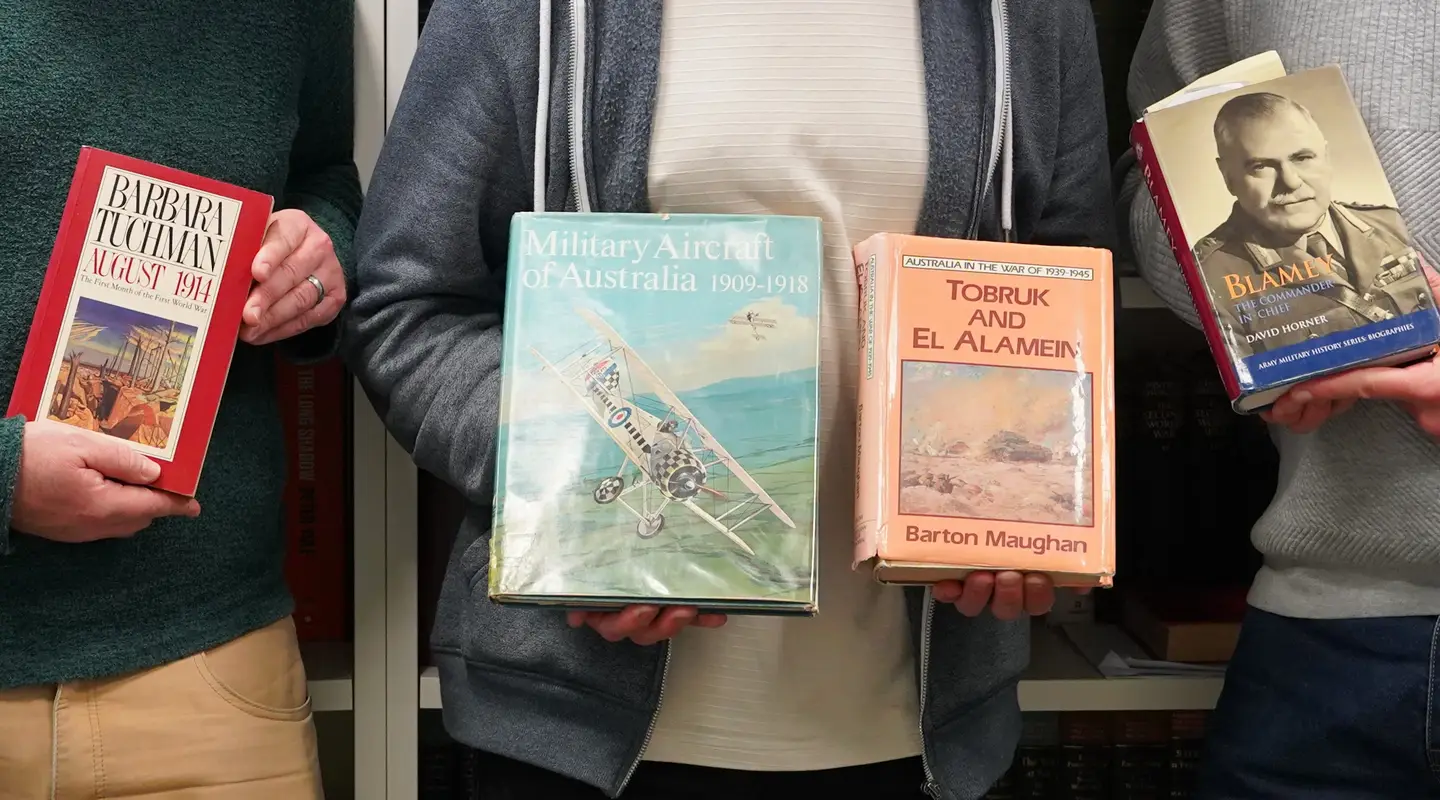For National Book Week, historians at the Australian War Memorial have reflected on the books that first sparked their love of history and inspired the careers they have today.
Karl James, Head of Military History Section
“Blamey was a bum,” was how my grandfather, a Second World War veteran, introduced me to the story of Field Marshal Sir Thomas Blamey. Many still hold this view, and I may have too if I’d not been told at university to read and think about David Horner’s Blamey: The Commander-in-Chief (1998). I did. And I’ve engaged, critiqued and returned to this book, and of course, the topic, many times since. It inspired both my honours and PhD theses on Australia’s involvement in the final campaigns in 1944–45, which led to me working as a historian here at the Memorial. Was granddad, right? Read the book and you can decide.
Lachlan Grant, Senior Historian
Two books that had a big influence on me are Evan S. Connell’s Son of the Morning Star (1985), and Tim O’Brien’s The Things They Carried (1990). I discovered them by accident browsing the library bookshelves when I was a university student and was completely engrossed. Connell wrote about the Indian Wars in the American west in the nineteenth century. O’Brien was an infantryman in the Vietnam war and has written several works that draw on his wartime experiences. Both Son of the Morning Star and The Things They Carried deal with themes of memory, myth, reality and the truth when it comes to war stories and history telling. They are reminders to think about our sources, and the ways in which they can be incorporated into our work.

Our military history experts with the books that shaped them. (L-R): Michael Kelly, David Sutton, Garth O'Connell, Karl James, Lachlan Grant, Tom Rogers, Craig Tibbitts.
David Sutton, Senior Historian
I read Barbara Tuchman’s The Guns of August (1962) when I was a teenager and was captivated both by the important story but also the brilliant writing style. The scholarship may have moved on, and I now specialise in a different world war, but this work was hugely influential in my decision to study history, and the style of history I wanted to write.
Emily Hyles, Assistant Curator
For a raw and visceral read, Edward Lynch’s Somme Mud: The War Experiences of an Australian Infantryman in France 1916–1919(2008) – edited by Will Davies – is my favourite soldier memoir. A review using cliches would call it a tour de force or Australia’s answer to All Quiet on the Western Front. And in every sense, it is. The book was written in 1921, likely as a therapy for Private Edward Lynch, who served with the 45th Battalion. The manuscript was discovered and published nearly 90 years later by Will Davies.
Lynch’s war was fairly standard. A young private, Lynch was keen, frightened, patriotic, and wounded three times. His memoir documents the tedium and discomfort of trench warfare, yet it is evocative and witty. An interesting companion to Somme Mud is Will Davies’ In the Footsteps of Private Lynch (2008) which retraces Private Lynch’s war. Both books are accessible to any reader – powerfully descriptive and must-reads for anyone interested in soldier memoirs of the First World War.
Craig Tibbitts, Senior Historian
Of early influence and now sentimental value, my pick is Land Battles by Alastair Revie (1974). It was my first military history book. As a boy I was fascinated by famous battles such as Metaurus (207BCE), Agincourt, Bunker Hill, Austerlitz, Balaclava, Second Bull Run, the Somme, Gazala, Stalingrad, Monte Cassino, Battle of the Bulge, and Operation Commando (Maryang San). Ever since, I’ve kept reading a broad range of military history from ancient times, from ‘Horse & Musket’, through to the 20th century and beyond. It’s important to have a broad knowledge. Revie's book sits on the bookshelf in my office here at the AWM.
Garth O’Connell, Assistant Curator
When I was nine, I bought this copy of Military Aircraft of Australia 1909-1918 (1971) by Keith Isaacs at the Memorial bookshop, and as soon as my family got me back to the hotel, I signed my name in it. I've read it from cover to cover many times and it’s been on my office bookshelf for over twenty years. I even referred to it earlier this week for a question regarding the Aircraft Hall mural!
During a Year 10 high school visit to Canberra my teachers dropped me off at the Memorial and continued with the rest of the group to visit the High Court and so forth. At the end of this visit I purchased a copy of Tobruk and El Alamein (1966) by Barton Maughan, and after the Memorial closed, I sat on the front steps waiting for my school bus to return.

Collection of our expert's favourite military books
Michael Kelly, Historian
For me, that book is Bill Gammage’s The Broken Years: Australian soldiers in the Great War (1974). I found a battered old copy of the book in my dad’s bookshelf when I was in year 7, and something about the battered looking soldier on the cover made me pick it up and start reading. The narrative writing, the immediacy of the soldier voices had an immediate and life-long effect on my engagement with history. The Broken Years profoundly influenced my writing, using veterans’ voices in bringing history to life in an engaging way. I managed to buy a first edition copy, which Bill kindly signed, and it has pride of place in my bookshelves.
Thomas Rogers, Senior Historian
My pick is Mr Bligh’s Bad Language: Passion, Power, and Theatre on the Bounty (1992) by Greg Dening. I never met Greg Dening, but his influence as a professor of history at the University of Melbourne was still evident when I started there. Several of my teachers recommended Mr Bligh’s Bad Language to me, and I read it when I began my Honours year. It is an extraordinary book. Dening’s thesis is that Captain Bligh did not understand the theatre of power aboard a Royal Navy ship – and that this was the fundamental cause of the infamous mutiny on HMS Bounty in 1789. Power does not come from a commission, contrary to Bligh’s belief, even in such a rigidly hierarchical organisation as the Royal Navy. I have been thinking about power, culture, and personalities in history ever since.

![Somme Mud [young readers edition]](/sites/default/files/styles/rollup/public/images/2025-08/729-somme-mud-abridged.jpg.webp?itok=59LPtpo_)